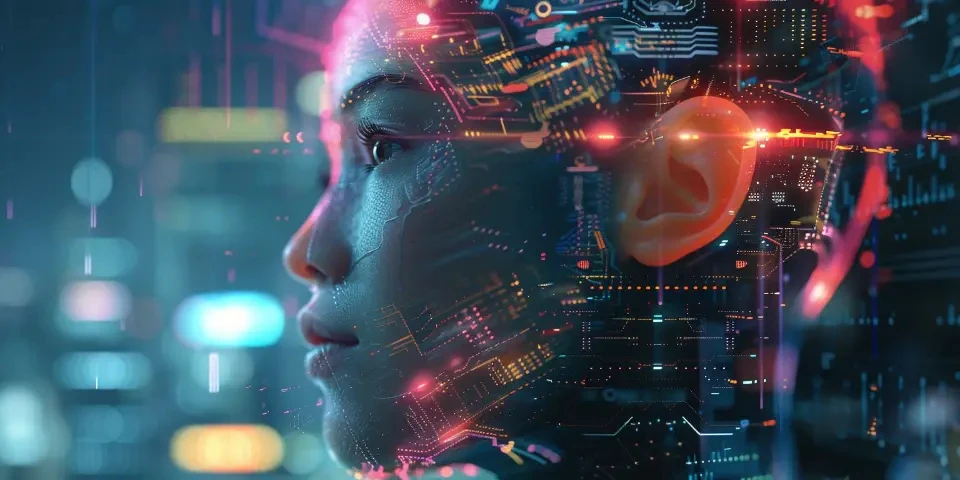Unlocking the Power of AI How it Can Revolutionize Everyday Life
Artificial Intelligence (AI) has rapidly emerged as a game-changer in various industries, transforming the way we live and work. With its ability to analyze vast amounts of data, make predictions, and learn from experience, AI holds immense potential to revolutionize everyday life in numerous ways. In this article, we will delve into several key aspects where AI can make a significant impact:
1. Healthcare
AI has the potential to revolutionize healthcare by improving diagnosis, treatment plans, and personalized medicine. By leveraging machine learning algorithms, AI systems can analyze medical records, genetic information, and symptoms to provide accurate diagnoses and recommend the most effective treatment plans.

In addition, AI-powered robots and devices can assist in performing complex surgeries with increased precision and efficiency. They can also monitor patients' health conditions continuously and alert healthcare providers of any anomalies in real-time.
2. Education
AI can transform education by personalizing learning experiences, allowing students to learn at their own pace and providing tailored content based on individual needs. AI-powered virtual tutors can adapt to students' learning styles, identify areas of improvement, and provide interactive and engaging educational experiences.
Moreover, AI can support teachers by automating administrative tasks, such as grading assignments and providing instant feedback. This enables educators to focus more on developing students' critical thinking and problem-solving skills.
3. Transportation
The introduction of AI in transportation opens up new possibilities for safer and more efficient systems. Self-driving cars, enabled by AI algorithms, can reduce human errors and accidents on the road. They can also optimize traffic flow, reducing congestion and minimizing fuel consumption.
AI can also improve public transportation systems by predicting demand patterns, optimizing routes, and providing real-time updates to commuters. This can lead to smoother and more reliable transportation experiences.
4. Retail
AI is revolutionizing the retail industry by enhancing customer experiences and streamlining operations. Recommendation systems powered by AI algorithms can provide personalized product suggestions based on customers' preferences, browsing history, and purchase behavior, increasing customer satisfaction and driving sales.
Additionally, AI-powered chatbots enable instant and efficient customer support, addressing queries and resolving issues in real-time. This improves customer service while reducing the workload on human support agents.
5. Finance
AI is reshaping the financial industry by introducing automation, improving fraud detection, and developing smarter investment strategies. AI algorithms can analyze vast amounts of financial data to predict market trends, helping investors make more informed decisions.
Furthermore, AI-based systems can detect and prevent financial fraud by analyzing patterns and anomalies in transactions, significantly reducing fraudulent activities.
6. Entertainment
AI is enhancing the entertainment industry by personalizing content recommendations and creating immersive experiences. Streaming platforms leverage AI algorithms to analyze users' viewing history and preferences, offering tailored recommendations for movies, TV shows, and music.
Moreover, AI-powered technologies, such as virtual reality (VR) and augmented reality (AR), enable users to immerse themselves in virtual worlds and interact with digital content in unprecedented ways, revolutionizing gaming and entertainment experiences.
7. Cybersecurity
As advancements in technology continue, AI becomes crucial in combating cyber threats. AI-powered cybersecurity systems can identify and respond to suspicious activities, detect malware, and protect networks and sensitive data from cyber-attacks.
By continuously learning and adapting to new threats, AI can enhance the overall security posture and safeguard individuals, businesses, and organizations from evolving cyber risks.
8. Agriculture
AI holds great potential in revolutionizing agriculture by optimizing crop yield, enhancing precision farming, and improving resource allocation. AI algorithms can analyze environmental data, soil conditions, and crop characteristics to provide insights and recommendations for farmers.
In addition, AI-powered robots and drones can perform tasks like planting, harvesting, and pest control with increased precision and efficiency, reducing the dependency on manual labor and improving overall productivity in the agriculture industry.
Frequently Asked Questions:
Q: Can AI completely replace human jobs?
A: While AI automation may eliminate certain tasks, it also creates new job opportunities. AI is primarily designed to augment and enhance human capabilities rather than replace them entirely.
Q: Is AI safe in terms of data privacy?
A: AI systems rely on data, and ensuring data privacy is of utmost importance. Organizations and governments need to implement robust security measures and regulations to protect personal and sensitive information.
Q: Are there any ethical concerns surrounding AI?
A: Yes, AI raises ethical concerns regarding decision-making, bias, privacy, and job displacement. These challenges must be addressed to align AI development with ethical principles and ensure its responsible use.
References:
1. Smith, J. (2021). AI in Healthcare: Benefits, Challenges, and Future. Towards Data Science. Retrieved from
2. Johnson, T. (2020). AI in Education: Benefits and Challenges. Retrived from
3. Brown, A. (2021). AI in Transportation: Revolutionizing Mobility. TechXplore. Retrieved from
Explore your companion in WeMate